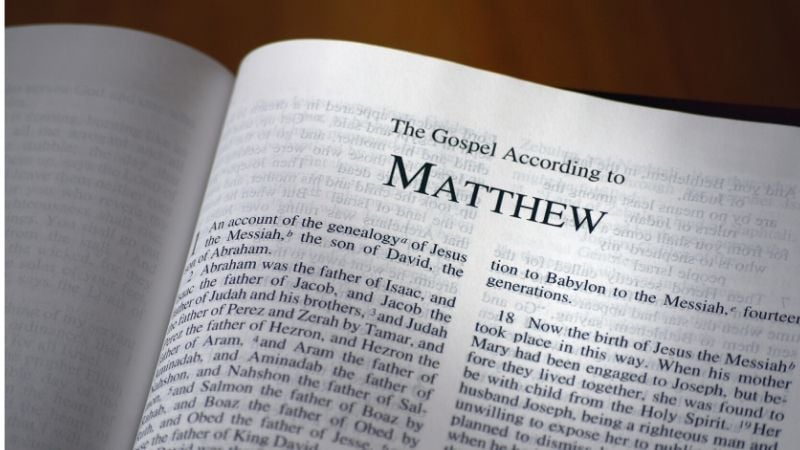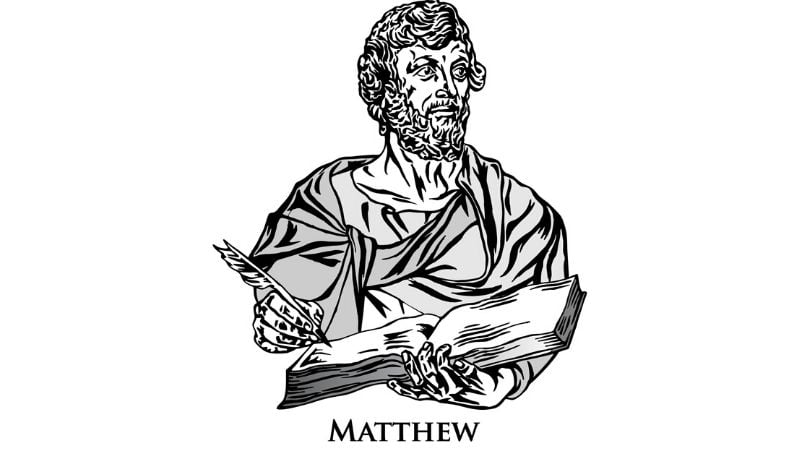Who was Matthew the tax collector? We know that this Jesus follower is the author of the Gospel of Matthew, but what specific details do we know about his life.
In this article we'll be taking a brief look at Matthew the Apostle and his importance to the Christian faith as one of Christ's disciples.
The Gospel of Matthew: Who is Matthew the Apostle?
The gospels tell us that Matthew the Apostle (also known as Levi, the son of Alphaeus) was a tax collector. In Matthew 9:9 (NIV), we read the following: "[Jesus] saw a man named Matthew sitting at the tax collector’s booth. 'Follow me,' he told him, and Matthew got up and followed him."
But the Gospel of Matthew isn't the only place where we learn about Matthew the tax collector. Luke 5:27-29 (NIV) tells us a bit more about what Matthew the Apostle sacrificed to follow Christ:
"After this, Jesus went out and saw a tax collector by the name of Levi sitting at his tax booth. 'Follow me,' Jesus said to him, and Levi got up, left everything and followed him. Then Levi held a great banquet for Jesus at his house, and a large crowd of tax collectors and others were eating with them."
It's pretty amazing to see that Matthew the Apostle stood right up to follow Jesus and that he "left everything" when he did so. We also learn here that Matthew the tax collector held a banquet for Jesus and that many other tax collectors joined them.
WATCH: GET A FREE PURE FLIX TRIAL TO SEE THOUSANDS OF TV SHOWS AND MOVIES
Matthew the Apostle: Other Details
We know that Matthew was a tax collector in Capernaum, a town on the Sea of Galilee. His gospel — which is named after him — helps bring together details of Christ's birth and ministry. And, as GotQuestions.org notes, it's the longest of the gospels.

We know that Jewish tax collectors, like Matthew, were not well liked by other Jews because of their complicity and work with the Roman government.
And so Matthew the Apostle's acceptance by Jesus is that much more fascinating, showing that no one is immune or incapable of God's love, according to GotQuestions.org.
Beyond that, it's amazing to consider that Matthew the Apostle left what was likely a life of riches in order to follow Jesus — a path that led to many struggles for the disciples and early church.
Gospel of Matthew: Biblical Lessons From Matthew, Tax Collector
One of the most amazing things about the Gospel of Matthew is not only the insight it gives on Jesus' birth, life and ministry, but also the embedded life lessons that give us greater insight on biblical truth. There are a variety of powerful truths in the Gospel of Matthew, but here are just a few:
Gospel of Matthew: Jesus' Words Are Timeless
"Heaven and earth will pass away, but my words will never pass away. “But about that day or hour no one knows, not even the angels in heaven, nor the Son, but only the Father. As it was in the days of Noah, so it will be at the coming of the Son of Man." - Matthew 24:35-37 (NIV)
Matthew the Apostle records an important truth in Matthew 24:35-37: Jesus' words will never pass away and are thus timeless.
READ ALSO: JOHN 3:16 MEANING: UNDERSTAND THIS TRANSFORMATIVE BIBLE VERSE
The verse also speaks about the end times, with Matthew the tax collector quoting Jesus proclaiming that His return will come at a time reflective of what happened during the days of Noah. Genesis 6:5-7 (NIV) gives greater insight:
The Lord saw how great the wickedness of the human race had become on the earth, and that every inclination of the thoughts of the human heart was only evil all the time. The Lord regretted that he had made human beings on the earth, and his heart was deeply troubled. So the Lord said, 'I will wipe from the face of the earth the human race I have created—and with them the animals, the birds and the creatures that move along the ground—for I regret that I have made them.'"
You can read more of Matthew the Apostle's words in Mathew 24 on Biblica.

Matthew the Apostle: On Judging Others
Another powerful lesson about judgement is found in the Gospel of Matthew, with Matthew the Apostle writing about the importance of not judging others and of being aware of our own sins, whims and issues before we point out others' blunders.
Matthew 7:1-5 offers a plethora of insight on this important reality. The scripture reads:
“Do not judge, or you too will be judged. For in the same way you judge others, you will be judged, and with the measure you use, it will be measured to you. 'Why do you look at the speck of sawdust in your brother’s eye and pay no attention to the plank in your own eye? How can you say to your brother, ‘Let me take the speck out of your eye,’ when all the time there is a plank in your own eye? You hypocrite, first take the plank out of your own eye, and then you will see clearly to remove the speck from your brother’s eye.'"
This is an essential reminder from Jesus (via Matthew the Apostle) to be aware of our own sins and issues — something we might sometimes forget to do while we look at others' blunders.
Matthew the Apostle: Don't Serve Two Masters
Matthew the Apostle delivers yet another important reminder when he quotes Jesus' words about the importance of handling wealth in a proper way. These words are found in the Gospel of Matthew, specifically in Matthew 6:24.
Jesus proclaims, “No one can serve two masters. Either you will hate the one and love the other, or you will be devoted to the one and despise the other. You cannot serve both God and money."
The lesson here is simple: God must come before money.
That wraps our explainer on Matthew the Apostle and the biblical truth he teaches us all. Want more biblical inspiration? Check out our Bible verse guide today!



COMMENTS